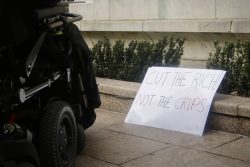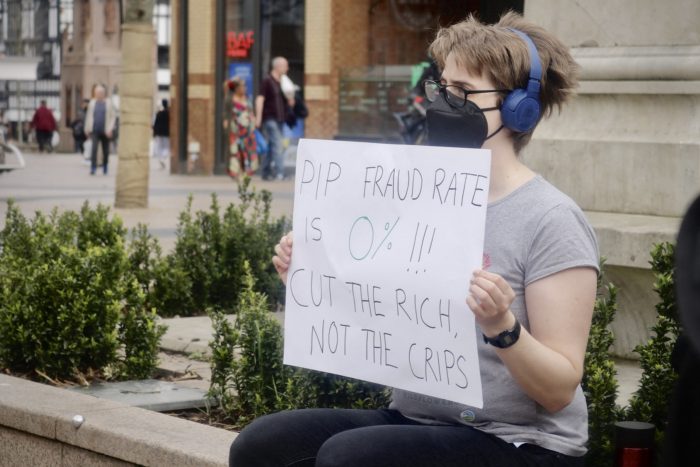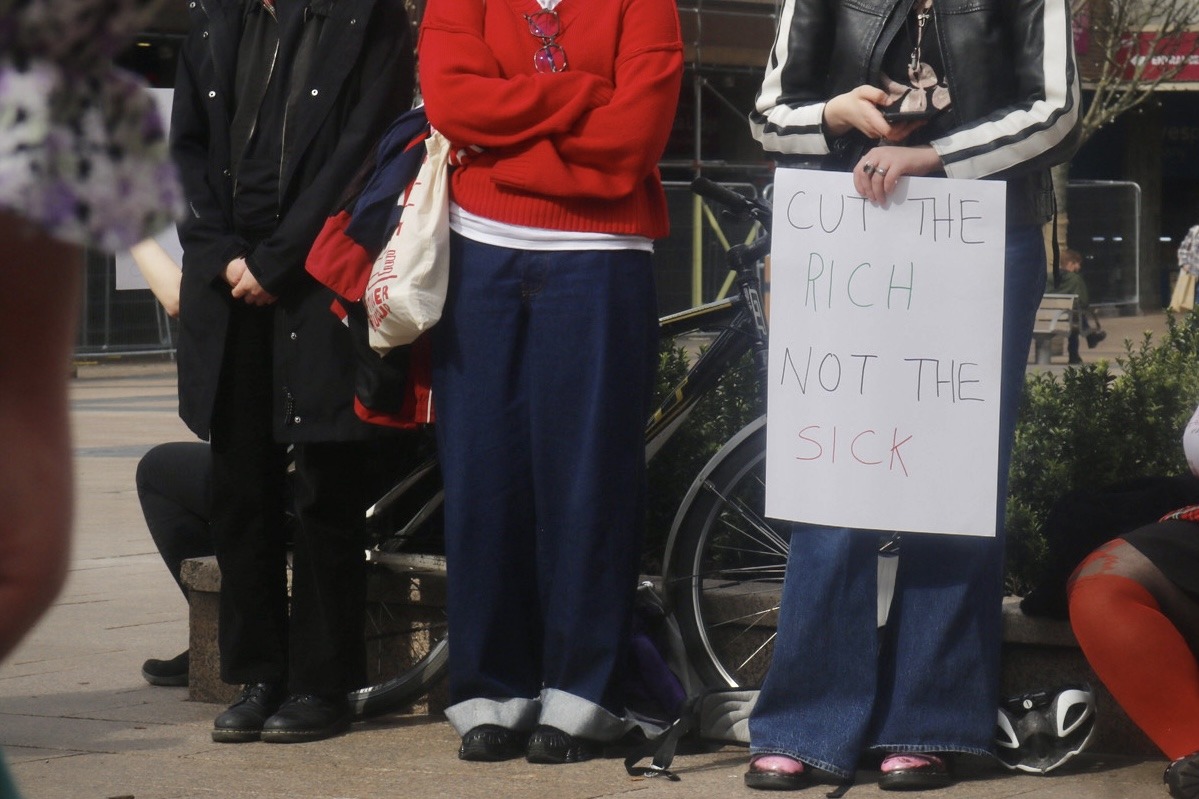Coventry campaigners protest ‘despicable’ and ‘cowardly’ disability benefit cuts
Disability rights activists in Coventry have protested against the Government’s disability benefits cuts, branding the plans as “a weak, cowardly attack” on over a million disabled people.
The demonstration held in Coventry’s central Broadgate square on 22 March formed part of a ‘National Day of Action’ organised by disability rights group Crips Against Cuts.
The protest was attended by over 35 people, with eight speakers including students and trade unionists delivering speeches to the crowd gathered next to the Lady Godiva statue.
The protest was held amid a raft of proposed reforms to the current benefits system with campaigners arguing that the cuts will harm disabled people across the country.
Among the speakers was Nye Steele, co-Disabled Students’ Officer at Warwick Students’ Union (SU). He condemned the proposed benefits cuts as a “despicable attack on the rights of disabled people”, adding that “they will force some people into unsuitable jobs and inaccessible workplaces, and other people into poverty”.
The Department for Work and Pensions has estimated that 3.2 million families will lose £1,720 a year on average due to the Government’s raft of benefit changes
Central to the reforms is a tightening of the eligibility criteria for the Personal Independence Payment (PIP), a universal benefit which is intended to cover the extra costs associated with living with long-term health conditions and disabilities.
The changes to PIP are also accompanied by cuts to Universal Credit (UC) incapacity benefits, with payments to new claimants to be cut by 50% from April 2026.
The Government has also confirmed that people aged under 22 will no longer to be able to claim the UC incapacity benefit top-up.
The Department for Work and Pensions has estimated that 3.2 million families will lose £1,720 a year on average due to the Government’s raft of benefit changes.

Image: @jjsgalleria / Instagram
The cuts will also push 250,000 more people into relative poverty, and 150,000 into absolute poverty. 3.8 million families, however, are expected to gain an average of £420 a year, primarily due to a planned increase in the UC ‘basic’ rate.
The Government’s reforms are being implemented against the backdrop of rapidly rising spending on disability and health-related benefits.
Prime Minister Sir Keir Starmer has described this growing cost, projected to rise to £100 billion by the end of this parliament, as “devastating”. Downing Street has also argued that there is a “moral and economic case” for reforms that reduce reliance on benefits.
[The reforms will] actively stop [disabled people] from working
Esther Reeves, Coventry City Councillor, Greens
Speakers at the protest in Coventry shared their concerns about the proposed cuts, echoing earlier criticism that cutting benefits to encourage work was misguided.
Esther Reeves, a Coventry City Councillor representing the Green Party, noted that the Government’s reforms will “actively stop [disabled people] from working”. She went on to explain that while “many disabled people […] would love to work”, they are often held back by the high-cost barriers to entering the labour market – a problem benefits cuts will only make worse.
With many disabled people facing barriers to employment, they must increasingly rely on a disability benefits system that protestors have argued is already too limited and difficult to navigate.
Eve Miller, a disabled shop steward for the UNISON trade union, suggested PIP “is already at an unsustainably low amount”, with those claiming it having to navigate a “torturous and traumatic” application process.
These concerns were echoed by another demonstrator, who suggested that many of their disabled friends have had to “fight tooth and claw” to claim PIP, so they “can actually just survive”.
With the proposed reforms further tightening a benefits system already considered cruel and punitive by many, campaigners in attendance warned Labour’s cuts could push disabled people into poverty – and, in some extreme cases, to their deaths.
Throughout the protest, demonstrators led chants of “hey Keir Starmer, shame, shame, all the deaths are in your name” and “hey hey, ho ho, ableism’s got to go” between addresses by the speakers.
One speaker alleged that the Government was “murdering thousands of disabled people to save money”, accusing the Labour administration of “enacting genocide”.
Protestors also argued that the party was targeting the ‘wrong’ group of people altogether, claiming that the government should instead be focusing on taxing the wealthy
Campaigners also emphasised that this perceived mistreatment was emblematic of a Labour Party and broader society that fundamentally devalued disabled people.
Emma Round, a disability rights activist who recently joined Crips Against Cuts, suggested this oppression stems from a capitalist system that idolises “the ideal worker” – those that are economically productive – whereas disabled people, who often do not meet this expectation, are derided “as broken, as wrong, [and] as lazy”.
Beyond criticism of Labour’s benefit reforms, protestors also argued that the party was targeting the ‘wrong’ group of people altogether, claiming that the government should instead be focusing on taxing the wealthy.

A protestor criticises the Government’s decision to cut benefits, rather than implement a wealth tax. Image: @jjsgalleria / Instagram
Chants of “cut the rich, not the sick” were repeatedly exclaimed in the square, with one demonstrator, a carer for their disabled partner, describing Labour’s aversion to further tax rises on the rich as “absolutely criminal”, suggesting they were “absolutely no better than the Tories”.
This antipathy towards the government animated many of those protest, with some pledging to campaign against Labour at future elections.
Miller, for example, encouraged demonstrators to support independent socialist candidates from outside the Labour tent, adding that Labour-affiliated trade unions “can’t continue to endorse Labour” so long as the party supports benefits cuts.
My message to people would be that they should join in the proud British position of standing up against bullies, standing up against people that pick on the disabled, and to write to their MPs.
Emma Round, Crips Against Cuts activist
Dr Chantal Meystre, a lifelong Labour voter, was similarly disillusioned, noting: “This government really should be standing up for the voiceless, and I’m not at all certain that they are.”
While disabled people have historically faced myriad barriers to political activism, such as an absence of accessible third spaces, Labour’s cuts seem to have galvanised many into action.
Having “stepped away” from activist organising until recently, Round said they have “[thrown their] hat back in the ring” due to the proposed reforms. They added: “I want to see and do what I can to help amplify disabled people’s voices as we should shout about this.”
“My message to people would be that they should join in the proud British position of standing up against bullies, standing up against people that pick on the disabled, and to write to their MPs. Let them know that we don’t believe that this is a tough stance, that we see it for what it is: a weak, cowardly attack.”

Comments